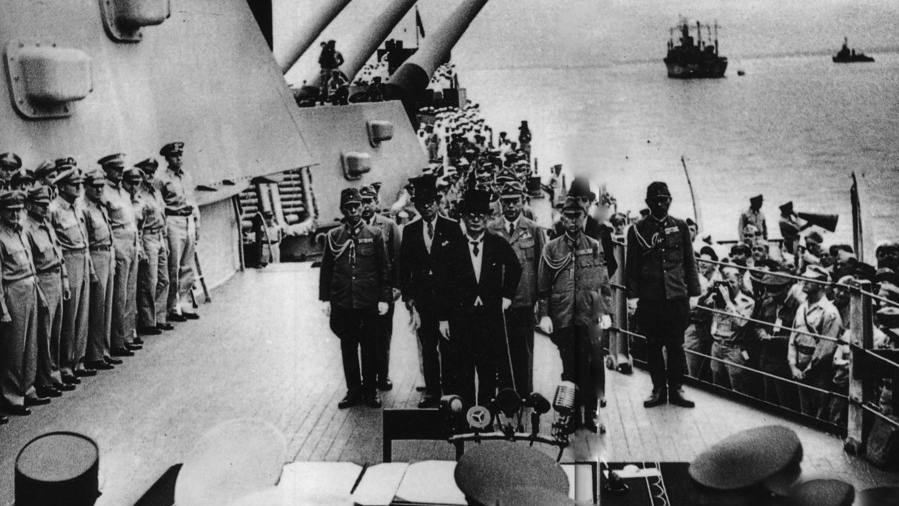
Editor's note: CGTN's First Voice provides instant commentary on breaking stories. The daily column clarifies emerging issues and better defines the news agenda, offering a Chinese perspective on the latest global events.
August 15 this year marks the 76th anniversary of Japan's unconditional surrender in World War Two. It is an anniversary of the sacrifice and struggle for self-determination in the region. From the Korean Peninsula to Vietnam and China, resistance fighters sought to repel Japanese occupation of their homeland that left a bloody and brutal legacy, eventually bringing an end to what has been described as the darkest period in these countries' histories.
Despite decades passing, these scars still run deep and many remain dismayed at contemporary Japan's lack of empathy, remorse and recognition of its crimes throughout the region. After its surrender, Tokyo has sought to re-brand itself as a "self-righteous" force in the region whilst still being unapologetic and dismissive towards this legacy. Japanese Defense Minister Nobuo Kishi commemorated this anniversary by visiting the controversial Yasukuni Shrine on Friday, a monument which glorifies war criminals.
Despite Tokyo's posturing, the legacy of Japanese imperialism must never be allowed to be resurrected in Asia. Nor will China ever be in a position to be brutalized, bullied and subjugated by Japan again. The world has changed, and while Japan glorifies the legacy of its former empire and its crimes, China is rising and is prepared to stand up to that challenge.
Seeing the rise of China, Japan is again seeking to emulate its past by pursuing a path of militarism with an aggressive rise in military spending, a growing adherence to Washington's preferences, and attempting to build coalitions against Beijing with other countries. It is again challenging Chinese sovereignty in various regions, including Taiwan, Xinjiang and Hong Kong.

Japan's surrender ceremony aboard the United States Navy battleship USS Missouri anchored in Tokyo Bay, September 2, 1945. /Xinhua
Japan's surrender ceremony aboard the United States Navy battleship USS Missouri anchored in Tokyo Bay, September 2, 1945. /Xinhua
Fearing a rising China, it has chosen this path instead of working out a harmonious co-existence with China or any attempt to build trust. In post-war Europe, France and Germany put aside centuries of conflict and mutual enmity in order to build a shared future based on regionalism and common interests. In Asia, this pathway has been blocked because unlike Berlin, Tokyo refuses to come to terms with its past and reconcile with the countries it once tyrannized. And the United States is encouraging this antagonism.
Japan's behavior represents a challenge to regional peace, prosperity and stability. In pursuing the military path as a worthwhile option and doubling down on its view that China is its inferior, it is provoking uncertainty.
China is no longer vulnerable to Japanese ambitions like before, but Tokyo continues to live in the past. It has adopted a foreign policy which is not only unapologetic about its past misdemeanours, but desires to be militaristic again in the belief it can confront China, whilst hypocritically projecting itself as a force for democracy and human rights.
The message to Japan is clear: It is time to wake up, inspect your history, and recognize that the perception of a "superior" Japan that had the divine right to confront China and undermine its sovereignty, and attempting to do it even today as in the Taiwan Straits, is a fallacy. It was not true in the past and is not true today.
The Chinese will not stand for it. They did not yesterday, they will not today, and they will not ever. This growing hunger for past glory, a whitewashing of past crimes and a thirst for militarism will, like it did 76 years ago, come to a dead end, even more dramatically today. It is time to look at the lessons of history and learn from them.
(If you want to contribute and have specific expertise, please contact us at opinions@cgtn.com.)

